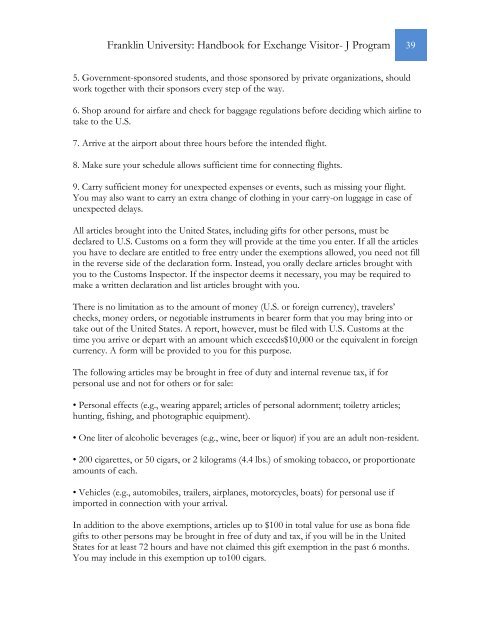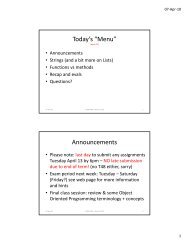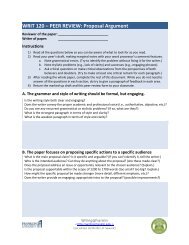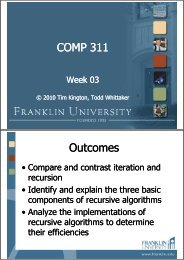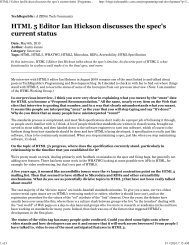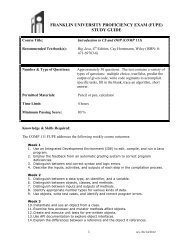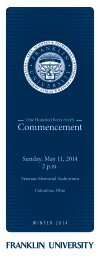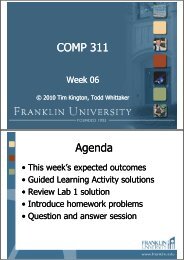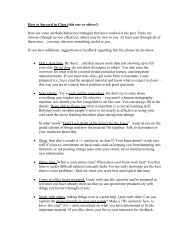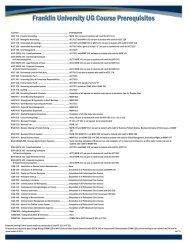Franklin University: Handbook for Exchange Visitor- J Program
Franklin University: Handbook for Exchange Visitor- J Program
Franklin University: Handbook for Exchange Visitor- J Program
You also want an ePaper? Increase the reach of your titles
YUMPU automatically turns print PDFs into web optimized ePapers that Google loves.
<strong>Franklin</strong> <strong>University</strong>: <strong>Handbook</strong> <strong>for</strong> <strong>Exchange</strong> <strong>Visitor</strong>- J <strong>Program</strong> 39<br />
5. Government-sponsored students, and those sponsored by private organizations, should<br />
work together with their sponsors every step of the way.<br />
6. Shop around <strong>for</strong> airfare and check <strong>for</strong> baggage regulations be<strong>for</strong>e deciding which airline to<br />
take to the U.S.<br />
7. Arrive at the airport about three hours be<strong>for</strong>e the intended flight.<br />
8. Make sure your schedule allows sufficient time <strong>for</strong> connecting flights.<br />
9. Carry sufficient money <strong>for</strong> unexpected expenses or events, such as missing your flight.<br />
You may also want to carry an extra change of clothing in your carry-on luggage in case of<br />
unexpected delays.<br />
All articles brought into the United States, including gifts <strong>for</strong> other persons, must be<br />
declared to U.S. Customs on a <strong>for</strong>m they will provide at the time you enter. If all the articles<br />
you have to declare are entitled to free entry under the exemptions allowed, you need not fill<br />
in the reverse side of the declaration <strong>for</strong>m. Instead, you orally declare articles brought with<br />
you to the Customs Inspector. If the inspector deems it necessary, you may be required to<br />
make a written declaration and list articles brought with you.<br />
There is no limitation as to the amount of money (U.S. or <strong>for</strong>eign currency), travelers’<br />
checks, money orders, or negotiable instruments in bearer <strong>for</strong>m that you may bring into or<br />
take out of the United States. A report, however, must be filed with U.S. Customs at the<br />
time you arrive or depart with an amount which exceeds$10,000 or the equivalent in <strong>for</strong>eign<br />
currency. A <strong>for</strong>m will be provided to you <strong>for</strong> this purpose.<br />
The following articles may be brought in free of duty and internal revenue tax, if <strong>for</strong><br />
personal use and not <strong>for</strong> others or <strong>for</strong> sale:<br />
• Personal effects (e.g., wearing apparel; articles of personal adornment; toiletry articles;<br />
hunting, fishing, and photographic equipment).<br />
• One liter of alcoholic beverages (e.g., wine, beer or liquor) if you are an adult non-resident.<br />
• 200 cigarettes, or 50 cigars, or 2 kilograms (4.4 lbs.) of smoking tobacco, or proportionate<br />
amounts of each.<br />
• Vehicles (e.g., automobiles, trailers, airplanes, motorcycles, boats) <strong>for</strong> personal use if<br />
imported in connection with your arrival.<br />
In addition to the above exemptions, articles up to $100 in total value <strong>for</strong> use as bona fide<br />
gifts to other persons may be brought in free of duty and tax, if you will be in the United<br />
States <strong>for</strong> at least 72 hours and have not claimed this gift exemption in the past 6 months.<br />
You may include in this exemption up to100 cigars.


